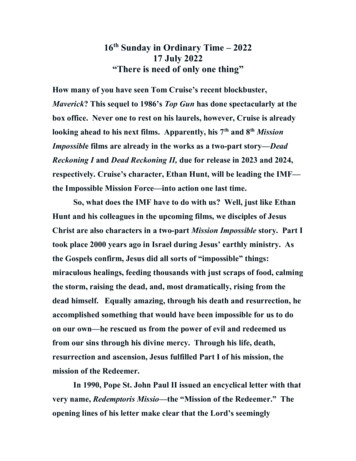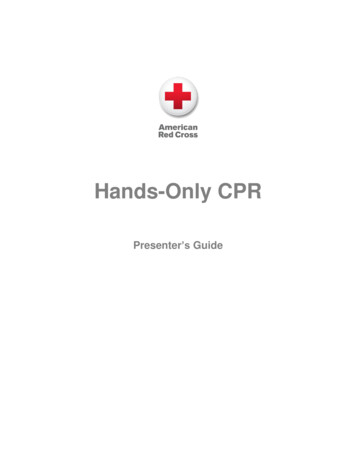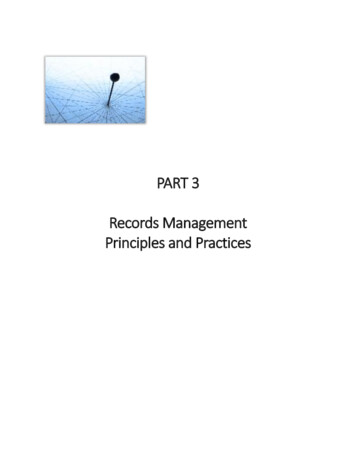
Transcription
16th Sunday in Ordinary Time – 202217 July 2022“There is need of only one thing”How many of you have seen Tom Cruise’s recent blockbuster,Maverick? This sequel to 1986’s Top Gun has done spectacularly at thebox office. Never one to rest on his laurels, however, Cruise is alreadylooking ahead to his next films. Apparently, his 7th and 8th MissionImpossible films are already in the works as a two-part story—DeadReckoning I and Dead Reckoning II, due for release in 2023 and 2024,respectively. Cruise’s character, Ethan Hunt, will be leading the IMF—the Impossible Mission Force—into action one last time.So, what does the IMF have to do with us? Well, just like EthanHunt and his colleagues in the upcoming films, we disciples of JesusChrist are also characters in a two-part Mission Impossible story. Part Itook place 2000 years ago in Israel during Jesus’ earthly ministry. Asthe Gospels confirm, Jesus did all sorts of “impossible” things:miraculous healings, feeding thousands with just scraps of food, calmingthe storm, raising the dead, and, most dramatically, rising from thedead himself. Equally amazing, through his death and resurrection, heaccomplished something that would have been impossible for us to doon our own—he rescued us from the power of evil and redeemed usfrom our sins through his divine mercy. Through his life, death,resurrection and ascension, Jesus fulfilled Part I of his mission, themission of the Redeemer.In 1990, Pope St. John Paul II issued an encyclical letter with thatvery name, Redemptoris Missio—the “Mission of the Redeemer.” Theopening lines of his letter make clear that the Lord’s seemingly
impossible mission does indeed have a Part II. John Paul II wrote, “Themission of Christ the Redeemer, which is entrusted to the Church, isstill very far from completion [T]his mission is still only beginningand we must commit ourselves whole-heartedly to its service.”So, Christ’s mission to reconcile us with God is also our mission.As Father David emphasized last week, that is why the Catholic Churchexists—to bring people to God. We are to be a healing presence, to calmpeople’s storms, to feed those in both physical and spiritual need. Weare called to make disciples and help them rise to spiritual life in JesusChrist. Jesus is the head and we are the body. So we have a share in hismission, and not just as a Church, but as individuals as well.At our parish mission last spring, our speaker, Tim Glemkowskimade a similar point. Tim encouraged us to focus on five specific mindsets—five ways to see and live joyfully as disciples making otherdisciples. The first of these was to recognize that “We all have a uniquecalling from the Father in this time. We were born in this time for areason. God trusted us to be Christians right now.”So, each of us is called to be a witness for Jesus Christ today. Butlet’s be honest. Right now, it is not particularly easy to be his witnesses.In our current apostolic era, the surrounding culture has been growingincreasingly hostile to Christianity for decades. For example, since2020, there have been 180 attacks on Catholic churches in America,including 50 just since May of this year, including 5 in Wisconsin. Ourchurches have been vandalized, fire-bombed, and desecrated by graffiti;statues have been defaced, and even tabernacles housing the preciousBody of Christ have been stolen. In such an atmosphere, it can be achallenge to proclaim the Gospel with joy, confidence, and boldness.
But those challenges are not unique to either our country or ourtime. For example, just last month, dozens of Catholic parishioners inNigeria were massacred during Mass by Islamic radicals, and a worldaway from Africa, two Jesuit priests who had spent their lives servingthe poor in the remote mountains of Mexico were murdered. Most ofour challenges pale in comparison. Similarly, in the first century, 10 ofJesus’ 12 apostles, as well as St. Paul, were executed for proclaiming theGospel and remaining faithful to it. Despite those dangers andobstacles, God chose those apostles to do his will in the first century,just as he has chosen us to be his witnesses right now in the 21st century.To an outside observer, Jesus’ instruction to his apostles—to“make disciples of all nations”—must have seemed like an impossiblemission. How could a handful of unremarkable people transform theworld so dramatically that in three short centuries, the Christian faithbecame the official religion of one of the greatest empires on earth? Itwould have been impossible, but for the power of the Holy Spirit. AsJesus reminds us in Matthew’s Gospel, “For mortals it is impossible,but for God, all things are possible.” Thus, as Jesus’ followers, we neednot be discouraged or afraid. We should pray for the unwavering trust,passionate commitment and dauntless courage of St. Joan of Arc whenshe said, “I am not afraid, for God is with me. I was born for this.”Today’s Gospel passage provides an important insight forfulfilling what we were born for. As Jesus explains to his frazzled andexasperated friend, “Martha, Martha, you are anxious and worriedabout many things. There is need of only one thing.” What is that onething? To sit at the Lord’s feet and listen.
Now, if we read that simple line by itself, alone and out of context,we might misunderstand it. We might think that the Lord prefers apassive, reflective Christianity over an active faith. But that’s not whatJesus is saying. In his gentle reprimand, he’s just reminding Marthahow important it is to listen to him before taking action. He desires ourservice, but Martha didn’t take the time to listen to him first. Listeningmust always be the first thing, the better part.But, elsewhere in the Gospels, Jesus makes it clear that genuinelistening requires both hearing and doing, putting into practice whatwe’ve heard. For example, at the end of the Sermon on the Mount, theLord said, “Everyone who listens to these words of mine and acts onthem will be like a wise man who built his house on rock. [When thestorm came] it did not collapse; it had been set solidly on rock. Andeveryone who listens to these words of mine but does not act on themwill be like a fool who built his house on sand. [For when the stormcame] it collapsed and was completely ruined” (Mt 7:24-27). So, even ifwe’ve been sitting reverently at Jesus’ feet, if we don’t act on his words,then we never really heard them in the first place. If we hear and thenact on them, however, then we share in his mission to accomplish theimpossible—the conversion of the world. As Jesus said at the LastSupper, “Amen, amen I say to you, whoever believes in me will do theworks that I do, and will do greater ones than these” (Jn 14:12).With that in mind now, let’s consider the opening scenes of all theMission Impossible shows—both TV and the movies. The leader of theteam—whether Jim Phelps or Ethan Hunt—always listens carefully to arecorded mission briefing, which then famously self-destructs in fiveseconds. Fortunately, our mission briefing does not self-destruct.
Instead, we’ve had the Word of God preserved in the Scriptures forthousands of years. That’s where we find our impossible missionbriefing. So let’s commit to truly listening to the instructions providedthere. Stop and really listen to the Lord’s words, particularly in theGospels, for Jesus himself is the Word of God spoken by the Father toall humanity. Through the incarnate Son of God—God made flesh—the Father speaks to us personally and directly. So, listen to what Jesussays, and listen also to what he does, for actions often speak louder thanwords. Find the time in your busy life to grow intimately familiar withthe Word of God in Scripture, and then act upon what you have heard.In this year of Eucharistic renewal, we should also listen to Jesusin the Eucharist. You may wonder how we can listen to him in theSacrament. Well, he is the Word of God, but he is not just revealed inthe passages of Scripture. We can encounter the Word even morepowerfully in the Eucharist, where we physically consume him—bodyand blood, soul and divinity. We ingest the Word of God, and if we doso reverently and conscientiously, then we have the opportunity to hearthat Word speaking to us from within. Once we have received him, thesacred heart of the Eucharist speaks from our own hearts so we canhear him as we nourishes and inspires us. So, after we receiveCommunion, let’s listen to Him and then put his word into practice.Fortunately, our efforts to listen to Jesus and to play our role inhis impossible mission need not be attempted alone. Recall that in thoseMission Impossible shows, the disembodied voice always makes the samedisclaimer at the end of each mission briefing: “As always, should youor any member of your IM Force be caught or killed, the Secretary willdisavow all knowledge of your actions.” Fortunately, Jesus never
disavows us when things get tough or go wrong. Instead, he is always byour side. Not only did the incarnate Son of God redeem us through hisdeath and resurrection, but then he also sent his Holy Spirit toaccompany us, to work through us, to help us accomplish his impossiblemission of redeeming the entire world.Which brings us back to the IMF, the Impossible Mission Force.As the Church, we are an impossible mission force; we are a team, eachof us with our own unique and indispensable role to play in the greatdrama of salvation, the great mission of the redeemer, the mission ofhumanity’s redemption. But perhaps we need a different name. I thinkthe acronym, IMF, still works, but allow me to suggest that the “I” inour IMF should stand for Incarnational Mission Force.Here’s why. First, our director, our leader, our “boss” is theIncarnation—God in the flesh, Jesus Christ himself. He has given usour mission. He is the Head, we are the Body—the team, the Church.We are also an incarnational mission force because now that Jesus hasascended, we are the physical incarnation of the Redeemer’s love. Webring him to the world—our hands, our hearts, our voices incarnateand make tangible the Word of God in today’s world. We are on amission to incarnate—to make physically present—the love of God withour very lives through the power of the Holy Spirit. Even when thatmission seems daunting, challenging, and virtually impossible, with Godnothing is impossible. Remember, with Ethan Hunt’s help, the IMFalways ends up accomplishing what seems to be an “impossible”mission. With God’s help in the real world, we will accomplish ourimpossible mission as well. After all, we were born for this.
,qvwhdg zh¶yh kdg wkh :rug ri *rg suhvhuyhg lq wkh 6fulswxuhv iru wkrxvdqgv ri \hduv 7kdw¶v zkhuh zh ilqg rxu lpsrvvleoh plvvlrq eulhilqj 6r ohw¶v frpplw wr wuxo\ olvwhqlqj wr wkh lqvwuxfwlrqv surylghg











